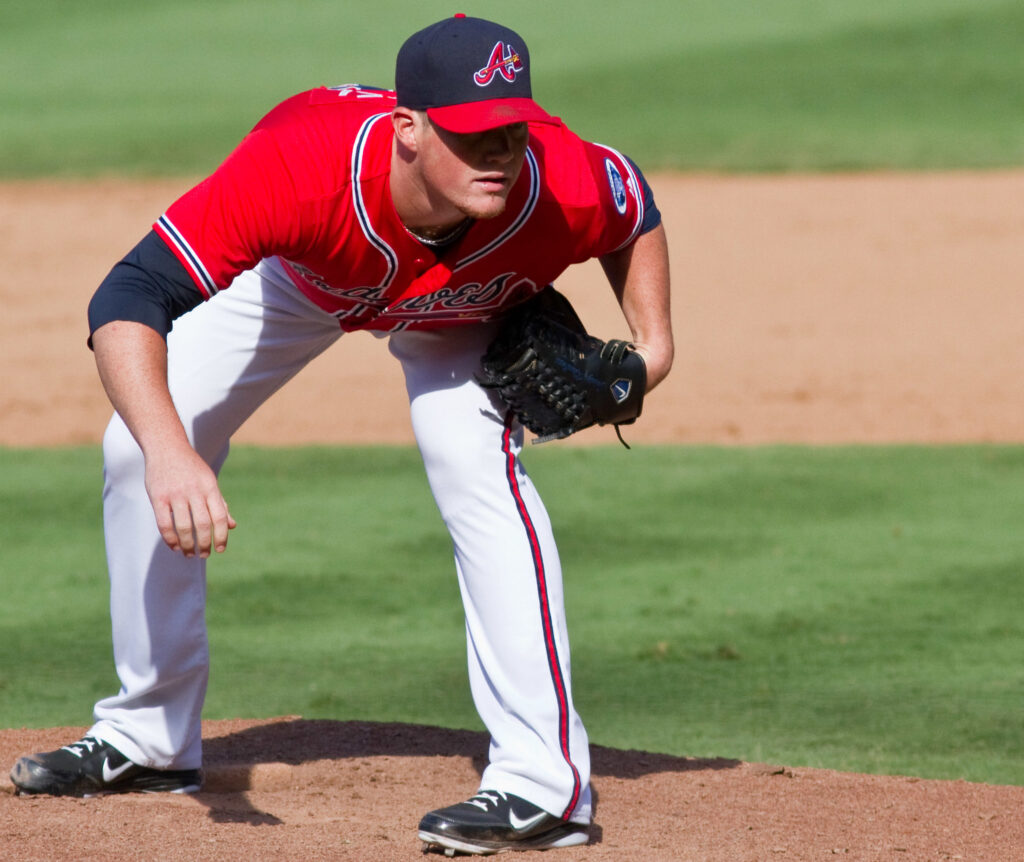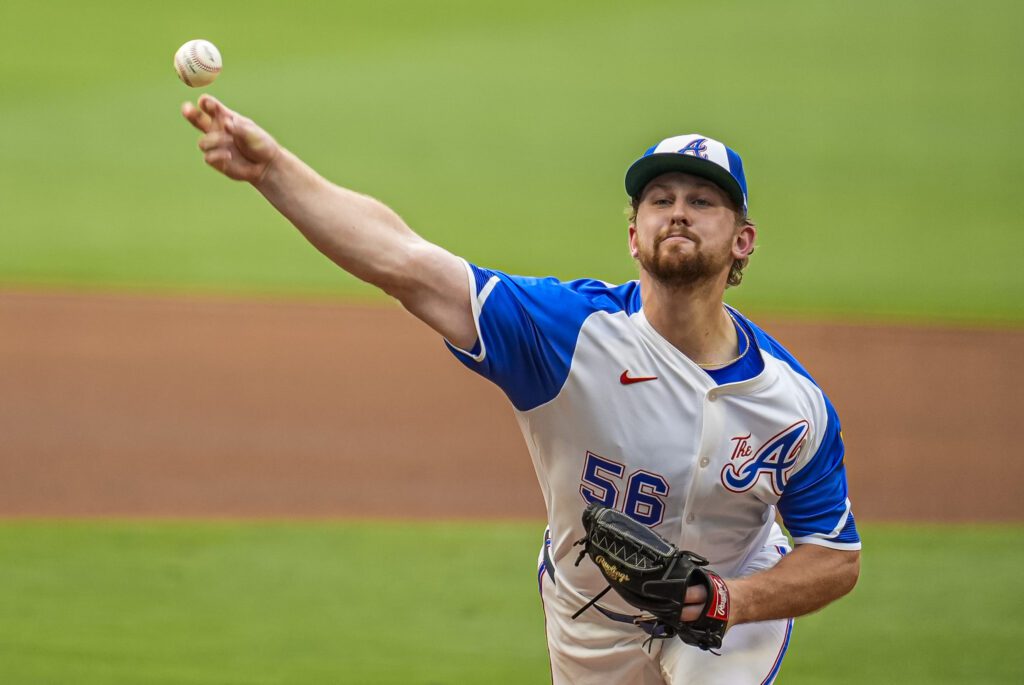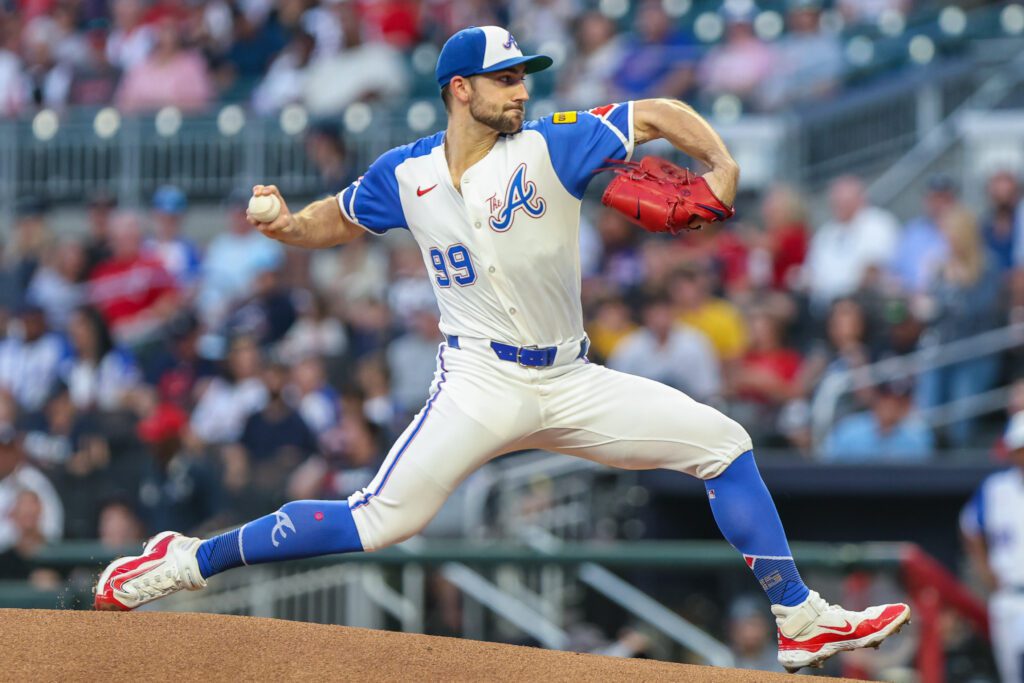This is the fifth and final article in a series that looks at the five best players at each position for every Atlanta Braves, a team that won the World Series in 2021.
The Braves have two periods of prolonged success in their nearly 150-year history. As they Beaneaters in the 1890s, they won five pennants and one world’s championship series. The more recent era of dominance has lasted from 1990 to the present, a 33-year stretch in which the Braves played in the postseason 22 times and went to the World Series six times, winning in 1995 and 2021. In the previous articles, the focus has been on the batters, several of which could be categorized as superstars. Now, the spotlight turns to the pitchers, with nine earning enshrinement in Cooperstown.
The Best Pitchers in Atlanta Braves History
Right-Handed Starters
Honorable mentions – Back when pitchers used to throw underhand, Albert Spalding was a star with the Boston Red Stockings franchise in the National League’s precursor, the National Association. He led the NA in wins in each of its five seasons and went 204-53 with a 2.21 earned run average while leading his team to four straight pennants from 1872-75. Spalding went on to become the owner of the Chicago White Stockings (later renamed the Cubs) and start the most successful sporting goods businesses in the country. He was inducted into the Baseball Hall of Fame in 1939.
Jim Whitney went 133-121 in five seasons with the Red Stockings and Beaneaters. In his rookie year of 1881, he posted a 31-33 record, a mark that allowed him to do something almost unheard of in today’s game, lead the league in both wins and losses. “Grasshopper’s” best season was 1883, when he went 37-21 with a 2.24 ERA and a league-high 345 strikeouts (a mark that is second to Charlie Buffinton‘s 417 in 1884 on the all-time franchise list). He fourth in team history with a 2.49 ERA and 242 complete games and he was also a solid hitter on the days he didn’t pitch. Whitney played with four other teams after leaving Boston. As a member of the American Association’s Philadelphia Athletics, he developed tuberculosis and passed away the following year.
Like Whitney, Tommy Bond spent five seasons with the Red Stockings, posting a 149-87 record from 1877-81, a time in baseball when batters had the right to call for a pitch to be thrown high or low. He led the National League in wins, earned run average and strikeouts twice each, tops the all-time franchise list with a 2.21 ERA and sits fifth in shutouts with 29. In his first season with Boston, the Ireland-born Bond won the pitching Triple Crown, leading the NL with a 40-17 record, a 2.11 ERA and 170 strikeouts.
The Braves had a good fortune with star pitchers in the 1800s, with a new one ready to take to the place of one that moved on. After Whitney left, it was time for John Clarkson, who came to Boston in 1888 and went 149-82 over the next five seasons. He won 30 or more games three times and won the pitching Triple Crown in 1889, going 49-19 with a 2.73 earned run average and 284 strikeouts while throwing a ridiculous 620 innings and 68 complete games. Clarkson is tied for sixth in team history with 226 complete games and is tied for ninth in wins and ERA (2.82). He died of pneumonia in 1909 and was inducted into the Baseball Hall of Fame in 1963.
Around the turn of the 20th century, the Beaneaters went from perennial power to bottom-dwellers. One bright spot on those bad teams was Vic Willis, who won 18 or more games five times during his eight seasons in Boston. He also set several records, with 27 wins in 1902 tying for the most in franchise history in what is called the “modern era” (since 1900). He also had 49 complete games in 1902 and lost 29 games in 1905, with both being modern era Major League records. Overall, Willis is third in franchise history with 268 complete games, seventh in innings (2,575) and shutouts (26), eighth in wins (151) and strikeouts (1,161) and tied for ninth with a 2.82 earned run average. He was inducted into the Baseball Hall of Fame in 1995.
5. Lew Burdette – You have to do something really good to beat out three Hall of Famers for this spot. Burdette spent 13 seasons with the Braves (1951-63), amassing a 179-120 (seventh-most wins in team history). The three-time All-Star won at least 18 games five times, eclipsing the 20-win mark twice. Although he had an ERA of 4.07 in 1959, he led the league with 21 wins and four shutouts. Burdette was an All-Star in 1957 after going 17-9, then went 3-0 against the Yankees to win World Series MVP honors in the Braves victory. He ranks fourth in franchise history with 30 shutouts and seventh in games pitched (468), games started (330) and innings pitched (2,638).
4. Kid Nichols – Here’s where the rankings get really tricky to put together. Nichols bridged the gap between Clarkson and Willis, winning 27 games in ten straight seasons and leading the league three straight years from 1896-98. Charles “Kid” Nichols had the most wins in baseball during the 1890s (298) and his 330 (to just 183 losses) rank second in franchise history. He was fourth in both games pitched (557) and games started (502) but tops the team list with an amazing 476 complete games. He was also second in shutouts (44), third in innings (4,549), sixth in strikeouts (1,618) and had 15 saves. After his playing career, Nichols owned and ran bowling alleys in Kansas City. He was elected to the Hall of Fame in 1949.
3. Phil Niekro – Here’s where the rankings get really tricky to put together. After spending his first four seasons as a reliever, Niekro converted to starting and hit the 20-win mark three times (including matching Whitney by leading the league in both wins and losses at 21-20 in 1979). One of the preeminent knuckleballers in baseball history, Niekro led the league in wins twice, losses, games started, complete games and innings four times each, plus ERA (with a 1.87 mark in 1967) and strikeouts (262 in 1977). He was a four-time All-Star and earned five gold gloves in a 21-year career with the Braves (1964-83 and 1987). After leaving, he won 32 games in two years with the Yankees, the last of which was number 300 in his career. “Knucksie” has the all-time franchise record with 740 games pitched, and he also ranks high with 595 games started, 4,622 1/3 innings and 2,912 strikeouts (second), 268 wins and 43 shutouts (third) and 226 complete games (tied for sixth). He was inducted into the Hall of Fame in 1997 and passed away in 2020.
2. John Smoltz – There is very little he didn’t do during his 20 years with the franchise. Smoltz was an eight-time All-Star who was an integral part of Atlanta’s success in the 1990s and 2000s. In 1996, he won the Cy Young Award after posting a 2.94 ERA and leading the league with a 24-8 record and 276 strikeouts. The win total is tied for the most in team history since World War I and the strikeout total is a Braves modern era record as well. Smoltz missed the 2000 season after undergoing Tommy John surgery and moved to the bullpen when he returned (more on that later). After four years as a closer, he returned to the starting rotation for another four seasons. Overall, Smoltz is the all-time franchise leader in strikeouts (3,011), and he ranks third in games pitched (708) and fifth in wins (210), innings (3,395) and games started (466). Smoltz had his share of playoff accolades as well. He went 15-4 with a 2.70 ERA in 41 postseason appearances, and he earned the NLCS MVP award in 1992 after winning two games in the series. Smoltz joined the ranks of the Hall of Fame in 2015.
1. Greg Maddux – He used pinpoint precision to become one of the most dominating pitchers of any era. Maddux started his career with the Cubs, winning the Cy Young Award in his final season in Chicago. He came to the Braves in 1993 and became the first pitcher ever to win four straight Cy Young Awards after going 19-2 in 1995. With Atlanta, Maddux was a six-time All-Star and a ten-time gold glove winner. He led the league in wins twice, ERA four times, complete games three times, shutouts five times and innings three times. Overall, Maddux ranks fifth in team history in strikeouts (1,828), sixth in wins (194) and games started (363), seventh in ERA (2.63), eighth in inning (2,526 2/3) and tenth in shutouts (21). He holds the top two spots on the franchise single-season ERA leaderboard with a 1.56 in 1994 and a 1.63 mark the following year. “Mad Dog” went 11-13 in 29 postseason starts, including 1-1 in the 1995 World Series. He was inducted into the Baseball Hall of Fame in 2014.
Left-Handed Starters
5. Ed Brandt – A forgotten starter from the late 1920s and early 1930s, Brandt won 94 games in eight seasons with the Braves from 1928-35, as stretch in which the team never finished higher than fourth. Although he lost a league-high 21 games as a rookie, Brandt turned his fortunes around by winning at least 16 games in four straight seasons from 1931-34.
4. Lefty Tyler – After a rough start, he developed into a solid starter for Boston during his eight seasons from 1910-17. George “Lefty” Tyler went 19-32 over his first three seasons, including a league-high 22 losses in 1912. He turned it around, winning 16 games or more three times, including a 16-13 mark with a 2.69 earned run average for the “Miracle Braves” during their 1914 championship season. Tyler finished with a 92-92 record, a 3.06 ERA and 22 shutouts (tied for eighth in franchise history).
3. Steve Avery – He could have been an ace on many other pitching staffs of his time, but he was a fourth starter with the Braves in the early 1990s. Avery went 72-62 from 1990-96, although half his wins were posted in two seasons. He went 18-8 in 1991 and earned his only All-Star selection after going 18-6 with a career-best 2.96 earned run average two years later. Avery was named NLCS MVP in 1991 after going 2-0 against the Pirates. Overall, he went 5-3 in 18 postseason appearances. He left the Braves in 1997 but came back after having surgery for a torn labrum in late 1999. Avery never pitched in the majors for the Braves and was released after the 2001 season. He returned for one ineffective season with the Tigers in 2003 before retiring.
2. Tom Glavine – Another longtime Brave, he spent 17 seasons in Atlanta. Glavine led the league with 17 losses in 1988, but he soon found his stride, winning 20 or more games five times and topping the National League each season. In two of those seasons, Glavine won the Cy Young Award (20-11 in 1991 and 20-6 in 1998). He also led the league in games started six times, and his 518 are third in team history. Glavine also ranks fourth in wins (244), innings (3,408) and strikeouts (2,091) and tied for eighth in shutouts (22). The 10-time All-Star and four-time silver slugger had extensive postseason experience, going 12-15 in 32 starts. Glavine was the MVP of Atlanta’s World Series victory in 1995 after posting a 2-0 record with a 1.29 earned run average. He was elected to the Hall of Fame with longtime teammate Maddux in 2014.
1. Warren Spahn – After a brief call-up with the then-Boston Bees in 1942, he missed the next three years due to military service. During World War II, Spahn fought in the Battle of the Bulge, earning a Bronze Star and a battlefield commendation, then returned late in the 1946 season. During his early career, Spahn was joined by Johnny Sain to form a solid 1-2 punch in a rotation that had few other options. The Braves went to the World Series on the backs of those two pitchers, a fact that was captured perfectly in the “Spahn and Sain and pray for rain” poem published by Boston newspapers at that time.
In 20 years with Boston and Milwaukee, Spahn won 20 or more games 13 times (he led the National League in that category eight times). He also topped the league in earned run average three times, games started twice, complete games nine times, and shutouts, innings pitched and strikeouts four times each. The 17-time All-Star earned his only Cy Young Award in the Braves’ 1957 title season, going 21-11 with a 2.69 ERA. Spahn tops the all-time franchise list in wins (356), games started (635), innings (5,046) and shutouts (63), and he sits second in games pitched (715) and complete games (374) and third in strikeouts (2,493). He also threw two no-hitters and hit 35 career home runs. Spahn made eight appearances in three World Series with the Braves, going 4-3 with a 3.05 ERA. He was inducted into the Baseball Hall of Fame in 1973.
Relief Pitchers
5. John Rocker – An above average fastball propelled him to the closer spot on a perennial playoff team, but his mouth was his undoing. Rocker totaled 83 saves in four seasons with the Braves, and he tacked on three more in 20 postseason appearances. However, he soon found himself out of Atlanta thanks to his temper and comments about people from other countries living in New York City.
4. Gene Garber – He alternated between closer and setup man during his 10 seasons in Atlanta, reaching 20 saves in a season four times with a high of 30 in 1982. Garber, who is tied for fourth in team history with 557 games pitched and ranks third with 141 saves, went 53-73 and posted a 3.34 ERA. He made two lackluster appearances with the Braves in the loss to the Cardinals in the 1982 NLCS.
3. Mark Wohlers – He was a closer for three seasons as part of a nine-year career with the Braves that lasted from 1991-99. Wohlers totaled 112 saves, good enough for fourth in team history, with 39 coming in 1996, helping him earn his only All-Star selection. However, his most famous save came in Game 6 of the 1995 World Series, when he was on the mound for the Braves’ first championship in 38 years. Wohlers had two saves in the series and nine overall in 38 playoff games with Atlanta.
2. John Smoltz – He converted to the bullpen during the 2001 season and quickly established that he could be just as effective as a reliever as he was as starter. Smoltz earned two All-Star selections in his four seasons as a closer, and he led the league and set a franchise record with 55 saves in 2002. He had two other seasons with 40 or more saves and his 154 rank second in team history.
1. Craig Kimbrel – He had one of the most dominant runs as a closer in the 21st century during his five-year stint with the Braves, and he registered the most saves in the decade of the 2010s with 346. Kimbrel led the league in saves four straight seasons, starting in 2011, when he had 46 to edge out teammate Freddie Freeman in Rookie of the Year voting. The four-time All-Star followed that with totals of 42, 50 and 47 saves, and his 186 are the most in franchise history. Kimbrel went 15-10 with a 1.43 earned run average in 294 games with the Braves and added one save in six postseason appearances. He was a part of a championship team with the Red Sox in 2018 and earned his ninth All-Star selection with the Phillies in 2023.
Next series will feature the Baltimore Orioles.
Upcoming
Other articles in the Braves series:
Catchers and Managers
First and Third Basemen
Second Basemen and Shortstops
Outfielders
Previous Series
A look back at the Arizona Diamondbacks
Catchers and Managers
First and Third Basemen
Second Basemen and Shortstops
Outfielders
Pitchers



